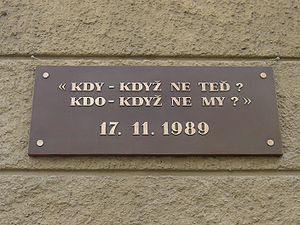Guinness contrasts the "impossible" revolution of truth over power with the present "crisis of truth" in Western culture, most particularly in its universities. The kind of truth that overthrew Communism is now considered dead. "At worst, it's socially constructed," says Guinness; "it's a testament to the community that said it and made it stick, and the power they had in expressing it."
Or, to oversimplify perhaps a bit: Truth is relative.
At the risk of letting Os Guinness write my blog, I want to share a fairly good chunk of his essay with you here, because I think it makes for excellent fodder for discussion. Beginning on page 40, he writes:
I want to argue that this crisis of truth is enormously important for both individuals and for the American Republic. Far from being Neanderthal and reactionary, truth is a very precious, simple, fundamental, human gift, without which we cannot negotiate reality and handle life. The truth is absolutely essential for a good human life. Equally important, truth is absolutely essential for freedom. And in the American Republic, where the challenge is not just becoming free but sustaining freedom, any people who would be free and remain free have to grapple seriously with the real challenge of truth.Concomitant with the crisis of truth is a crisis of character. Integrity is no longer in vogue; the only ideals are appearance, placement, "product identification." Guinness quotes Mark Twain: "In America, the secret of success is sincerity. If you can fake that, you've got it made," and Groucho Marx: "Hey, these are my principles, my moral principles. And if you don't like them, I've got others." If there is no objective truth, then there is no standard on which to build character.
Likewise related is a crisis of ethics. Without truth as an objective reality, evil becomes relative. Guinness bemoans, "I've been on campuses where, to put it simply, today it is worse to judge evil than it is actually to do evil." The moral compass, bereft of truth, simply spins, the needle sweeping across a face with no markings.
These are frightening times; but we are not without recourse, we who believe in a core, central Truth, and the God Who is True. And Guinness encourages followers of Jesus to hang onto that very key idea: we follow God Who is True. When we place faith in this God, we wake up and shake off the nightmare of relativism ("I believe because it is true for me."), subjectivism ("I believe because I feel it deeply.") and pragmatism ("I believe it because it works for me."), and in the light of day believe simply because it is the truth. "The Christian faith is not true because it works; it works because it's true," says Guinness. "Ultimately truth, for both Jews and followers of Jesus, is finally a matter of who God is" [emphasis mine].
When we understand this, we can resist being manipulated by image and power. We can speak truth into relativism without fear of rejection. We can take the risk to ask the relativist to apply his principles universally, including to his own pet theory of the relativity of truth. We can point out the end result of relativistic truth: "If there's no truth and truth is dead, and knowledge is only power, then might makes right. The victory goes to the strong, and the weak go to the wall." But if there is indeed truth, then "truth prevails for those who live in truth."
...and that's a good thing.


No comments:
Post a Comment